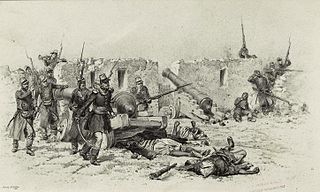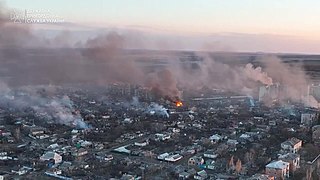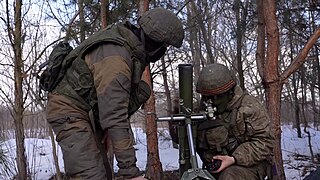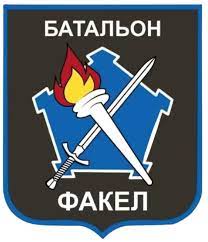
A penal military unit, also known as a penal formation, disciplinary unit, or just penal unit, is a military formation consisting of convicts mobilized for military service. Such formations may consist of military prisoners convicted under military law, civilian prisoners convicted in civilian courts, prisoners of war who have chosen to side with their captors, or a combination of these groups.

Yevgeny Viktorovich Prigozhin was a Russian mercenary leader and oligarch. He led the Wagner Group private military company and was a close confidant of Russian president Vladimir Putin until launching a rebellion in June 2023. Prigozhin was sometimes referred to as "Putin's chef" because he owned restaurants and catering businesses that provided services to the Kremlin. Once a convict in the Soviet Union, Prigozhin controlled a network of influential companies whose operations, according to a 2020 investigation, were "tightly integrated with Russia's Defence Ministry and its intelligence arm, the GRU".

The Wagner Group, officially known as PMC Wagner, is a Russian state-funded private military company (PMC) controlled until 2023 by Yevgeny Prigozhin, a former close ally of Russia's president Vladimir Putin. The Wagner Group has used infrastructure of the Russian Armed Forces. Evidence suggests that Wagner has been used as a proxy by the Russian government, allowing it to have plausible deniability for military operations abroad, and hiding the true casualties of Russia's foreign interventions.

Ukraine's easternmost oblasts, Donetsk, Luhansk, and Kharkiv, are the site of a theatre of operation in the ongoing Russian invasion of Ukraine.
During the Russian invasion of Ukraine, a battle took place between Russian forces and Ukrainian forces for control over the city of Marinka.

The battle of Bakhmut was a major battle between the Russian Armed Forces and the Ukrainian Armed Forces for control of the city of Bakhmut, during the eastern Ukraine campaign, a theatre of the Russian invasion of Ukraine. It is regarded by some military analysts to be the bloodiest battle since the end of World War II.

The battle of Soledar was a series of military engagements in and around the urban-type settlement of Soledar during the battle of Donbas in the Russian invasion of Ukraine.

Since 19 September 2022, a military campaign has taken place along a 60-km frontline in western parts of Luhansk Oblast and far-eastern parts of Kharkiv Oblast amid the Russian invasion of Ukraine. Also known as the Svatove–Kreminna line or the Kupiansk–Svatove–Kreminna–Bilohorivka line after the major settlements along the front, the campaign began a day after the Ukrainian Army recaptured the nearby city of Lyman during the Kharkiv counteroffensive after of which the front line froze over the next few months.

Yevgeny Anatolyevich Nuzhin was a convicted Russian murderer who enlisted in Wagner Group during the 2022 Russian invasion of Ukraine.
This timeline of the Russian invasion of Ukraine covers the period from 12 November 2022, following the conclusion of Ukraine's Kherson and Kharkiv counteroffensives, to 7 June 2023, the day before the 2023 Ukrainian counteroffensive began. Russia continued its strikes against Ukrainian infrastructure while the Battle of Bakhmut escalated.
The 72nd Separate Motor Rifle Brigade is an infantry unit of the Russian Ground Forces, part of the 3rd Army Corps.
The Wagner Group, also known as PMC Wagner, a Russian paramilitary organization also described as a private military company (PMC), a network of mercenaries, and a de facto unit of the Russian Ministry of Defence (MoD) or Russia's military intelligence agency, the GRU, has conducted operations in Ukraine since early 2014.

Redut, also known as Redoubt, Redut-Antiterror or Centre R, formerly known as "Shield", is a Russian Private Military Company (PMC) that is a part of the "Antiterror-family" — which consists of similarly named PMCs that protect commercial operations of Russian companies. It is currently deployed by Russia in the Russian invasion of Ukraine. According to an RFE/RL investigation, "Redut" is fully controlled and managed by the GRU and acts as a proxy umbrella organization for mercenaries, acting as a financial institution, and conducting recruitment and logistical supply of various formations.

Storm-Z is a series of penal military units established by Russia by April 6, 2023, at the latest. On June 24, 2023 Russian President Vladimir Putin signed a law disbanding Storm-Z and replacing it with new Storm-V units. However, on 12 February 2024, Dmytro Riumshyn, the commander of Ukraine's 47th Mechanized Brigade, claimed that Russian forces were deploying regular troops, sabotage groups, as well as both "Storm-Z" and "Storm-V" penal units in Avdiivka. Later, on 27 February 2024, Illia Yevlash, the spokesman for the Khortytsia operational-strategic group, claimed that Russian commanders were using human wave tactics involving Storm-Z and Storm-V.

On 23 June 2023, the Wagner Group, a Russian private military company, engaged in a major uprising against the Government of Russia. It marked the climax of the Wagner Group–Ministry of Defense conflict, which had begun about six months earlier. Russian oligarch Yevgeny Prigozhin, who had been leading Wagner Group activities in Ukraine, stood down after reaching an agreement a day later.

The rivalry between the then-head of Wagner Group, Yevgeny Prigozhin, and the leadership of the Ministry of Defence of the Russian Federation, headed by Sergei Shoigu, in the public sphere began in 2022 during the Russian invasion of Ukraine and ultimately led to the Wagner Group rebellion on the 23rd to 24th of June 2023. According to United States officials, Yevgeny Prigozhin had longstanding disputes with the Russian Ministry of Defence (MoD) "for years" prior to the full-scale invasion of Ukraine. However, these tensions escalated and became more public during this stage of the Russo-Ukrainian War. During the initial stages of the invasion, the Russian Ground Forces suffered significant casualties, but the announcement of mobilization for reservists was delayed by Russian president Vladimir Putin. As a result, authorities actively sought to enlist mercenaries for the invasion, which led to a heightened influence and power for Prigozhin and the Wagner Group. Prigozhin was allocated substantial resources, including his own aviation assets. Additionally, starting in the summer of 2022, he gained the authority to recruit inmates from Russian prisons into the Wagner Group in exchange for their freedom. Western intelligence estimated that the number of Wagner mercenaries increased from "several thousand" fighters around 2017–2018 to approximately 50,000 fighters by December 2022, with the majority comprising criminal convicts recruited from prisons.
Over the course of the Russian invasion of Ukraine, which began in February 2022, irregular military units began to play a more prominent role in the fighting, alongside the regular Russian Armed Forces. In the face of waning recruitment levels for the military as casualties mounted, the Russian government increasingly turned to a variety of mercenaries, militias, paramilitaries, and mobilized convicts. In a similar fashion to the pro-Russian people's militias in Ukraine such as the DPR People's Militia and LPR People's Militia, the combat effectiveness of these irregular combatants varies greatly. This can be seen in the contrast between the poorly equipped and virtually untrained prisoners serving under Storm-Z and the professional mercenaries of PMC Wagner. The Wagner group itself also used convicts in its ranks, alongside its more experienced cadre of fighters. The organization garnered much notoriety as it took up an increasingly prominent role in the fighting in late 2022, culminating in the Battle of Bakhmut.

Fakel is a private military company which is currently deployed by Russia in the Russian invasion of Ukraine.

Angry patriots, also known as the war party, Z-patriots, turbopatriots, ultrapatriots, and megavatniks, are a loose group of Russian ultranationalist political commentators and milbloggers in support of the Russian invasion of Ukraine, but critical of what they see as ineffective or incompetent prosecution of the war by the Russian government.

Storm-V is a series of penal military units established by a law which was signed by Russian President Vladimir Putin which disbanded Storm-Z and replaced it with Storm-V. The V in Storm-V stands for "vityazi", the Russian word for ‘knights.’













